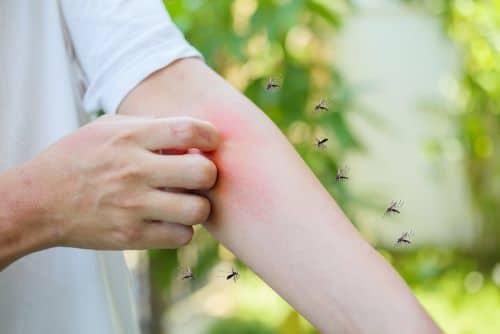Americans used to think of mosquitoes and other bugs as mere pests. The itchy bites were annoying, but nothing that could cause any real damage to our health.
Those days are over.
Mosquitoes, ticks, and fleas in the U.S.—as in many other parts of the world—have become major carriers of serious diseases. Zika, West Nile, Lyme disease, Dengue, Chikungunya, and the plague are now well established on our shores. In fact, the incidence of these insect-borne illnesses has tripled in the U.S. in the last 15 years.[1]
Many people use chemical bug repellents as their first line of defense. But using them is like coating your body in toxins. The primary ingredient in many commercial sprays and lotions is DEET.
It stands for N,N-Diethyl-meta-toluamide. Exposure to this chemical has been linked to memory loss, headaches, weakness, fatigue, muscle and joint pain, tremors, and breathing difficulties.
DEET is so corrosive that it will eat right through plastic and fabrics made of spandex and rayon. It even dissolves watch crystals and nail polish.
Yet, the manufacturers say we should smear it on our skin.
Many of us do it because DEET is widely seen as the most effective mosquito repellent on the market.
Now, finally, there is an alternative. It’s called nootkatone.
It’s a natural oil found in grapefruit and cedar trees. Unlike DEET, which smells awful, the new repellent has a pleasant citrus scent.
Not only have tests found it to be more effective than DEET, it is so safe that you can eat it.
“If you drink Fresca or Squirt, you’ve drunk nootkatone,” said Ben Beard. He’s a disease expert at the Centers for Disease Control and Prevention, which helped develop nootkatone (pronounced NEWT-kah-tone).[2]
Nootkatone doesn’t just repel all the worst bugs…it can kill them when used in higher concentrations. It’s effective even on insects resistant to DDT and other highly toxic insecticides.
Besides use as a mosquito and flea repellent, experts say nootkatone has great potential as an insecticidal soap. It could be used by people who live in tick-infested areas. Bathing with it would cause ticks to drop off.
It’s also superior to other natural repellents such as peppermint oil, citronella, and lemon grass oil. They lose their potency after about an hour. But nootkatone lasts as long as DEET and other synthetics.
Alexandra Dapolito Dunn is an administrator for the EPA. She said that in many areas of the United States, “mosquitoes have become resistant to currently available pesticides. A new active ingredient in our toolbox will help (insect-control) programs.”[3]
4 Natural Ways to Repel Mosquitoes
Nootkatone products are just starting to go on sale. They can be hard to find. But over the next year, nootkatone may replace DEET as the first-line defense against these and other pests. One brand available now is Mozzi Magic. Others will soon follow.
In the meantime, here are other ways you can keep mosquitos at bay naturally.
- Wear light clothing. Researchers at the University of Florida found that dark clothing attracts mosquitos.[4]
Mosquitos use their vision to search for food. The researchers theorize that dark colors make you stand out against the horizon. This makes it easier for mosquitos to see you. Wear white or lighter colored clothing that blends with the sky.[5]
- Take vitamin B1. It hasn’t been tested in clinical trials, but users of vitamin B1 swear by its anti-mosquito properties. It’s also known as thiamine. Take 25-50 mg three times a day. Kale, broccoli, beans, whole grains, and sunflower seeds are foods high in B1.[6]
- Hold the beer. Two studies have found that drinking beer increases mosquito bites. A 2010 study showed that mosquitos were 30% more likely to go after beer drinkers.
- Garlic. Colorado State University researchers found that rubbing crushed garlic on your skin can ward off bugs for hours. Of course, other humans might avoid you as well. This might be a good option for solitary campers and fishermen.
Insect-borne diseases are more widespread and serious than ever. Throw away the DEET and protect yourself and your family with safe and effective nootkatone-based repellents.
Editor’s Note: Discover the most effective natural methods to improve your health. Read our monthly journal Independent Healing. It’s your best source for unbiased, evidence-based medical information you won’t find anywhere else. To find out more, go HERE.
Related Articles
The Best Natural Mosquito Repellents
What the CDC Isn’t Telling You About Zika
Like this Article? Forward this article here or Share on Facebook.
[1]https://www.scientificamerican.com/article/mosquito-and-tick-borne-diseases-are-rising-in-the-u-s/
[2]https://www.courant.com/featured/sns-nyt-citrus-flavoring-weaponized-against-insect-diseases-20200815-tdqjmc7llnfwhgq7b457kcuqry-story.html
[3]https://consumer.healthday.com/environmental-health-information-12/pesticide-health-news-772/from-cedar-trees-and-grapefruit-rinds-comes-a-new-bug-repellent-760270.html
[4]https://weather.com/holiday/memorial-day/news/5-reasons-mosquitoes-are-attracted-you-20130716
[5]http://thepaleodiet.com/foods-to-eat-to-repel-mosquitoes-and-other-critters-that-bug-us
[6]https://edrugsearch.com/take-vitamin-to-repel-mosquitoes-all-summer

